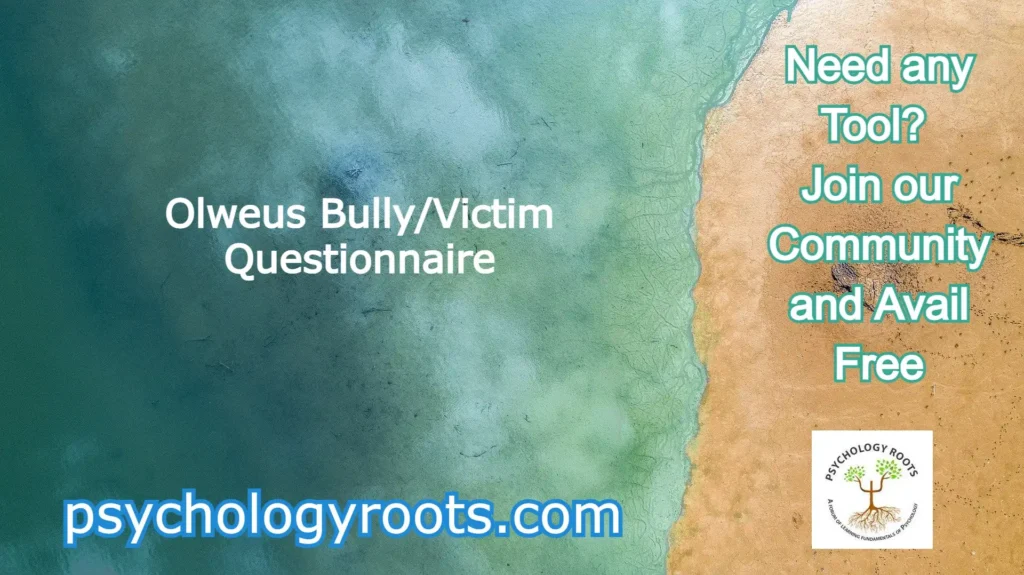Table of Contents
Olweus Bully/Victim Questionnaire
Here in this post, we are sharing the “Olweus Bully/Victim Questionnaire”. You can read psychometric and Author information. We have thousands of Scales and questionnaires in our collection (See Scales and Questionnaires). You can demand us any scale and questionnaires related to psychology through our community, and we will provide you with a short time. Keep visiting Psychology Roots.
About Olweus Bully/Victim Questionnaire
Scale Name
Olweus Bully/Victim Questionnaire
Author Details
Dan Olweus
Translation Availability
English

Background/Description
The Olweus Bully/Victim Questionnaire (OBVQ) is one of the most widely used and validated tools for assessing bullying behavior among school-aged children and adolescents. Developed by Dr. Dan Olweus, a pioneer in bullying research, this questionnaire evaluates both the prevalence of bullying and victimization in educational settings.
The OBVQ addresses a variety of bullying behaviors, including verbal, physical, relational, and cyberbullying. It also explores the frequency, location, and bystander roles in bullying situations. The questionnaire is a cornerstone of anti-bullying interventions and is often used to guide school policies and monitor the effectiveness of prevention programs.
This tool is essential for educators, psychologists, and policymakers aiming to create safer school environments. It provides critical insights into the dynamics of bullying, helping to identify high-risk groups and evaluate the overall school climate.
The Olweus Bully/Victim Questionnaire (OBVQ; Olweus, 1996) is a 40-item self-report measure for students in grades three to twelve. The measure defines bullying and then asks respondents to rate items in terms of frequency (Olweus, 1996). The measure assesses physical, verbal, indirect, racial, or sexual forms of bullying or harassment (Olweus, 1996). It also includes attitudes about bullying, where bullying takes place and methods of recourse.
Items are rated on a five-point scale, ranging from “did not occur” to “occurred several times in one week.” Responses are used to classify the child into non-bully/non-victim, victim, bully, and bully/victim groups. However, group classification is determined based on arbitrarily determined cut-points. According to Hunt, Peter, & Rapee (2012), there is little to no evidence to support the use of these cut points as determinants of group classification.
Administration, Scoring and Interpretation
- Obtain a copy: Secure the OBVQ from authorized sources, such as Olweus Bullying Prevention Program providers or official publications.
- Explain the purpose: Inform students and stakeholders that the questionnaire aims to understand bullying behavior to create a safer and more supportive school environment.
- Provide instructions: Ensure students know how to respond accurately and honestly based on their experiences. Clarify any terms or questions they might find confusing.
- Approximate time: Administration typically requires 20–30 minutes.
- Administer the scale: Conduct the assessment in a confidential and supportive setting, ensuring anonymity to encourage truthful responses.
Reliability and Validity
Reliability: The OBVQ demonstrates excellent internal consistency, with Cronbach’s alpha values frequently exceeding 0.80. Test-retest reliability supports its stability over time.
Validity: The scale has strong construct and criterion validity, correlating well with other measures of bullying and school climate. It has been extensively validated across diverse cultural and educational contexts.
Available Versions
39-Items
40-Items
Reference
Olweus, D. (1996). The Revised Olweus Bully/Victim Questionnaire. Research Center for Health Promotion (HEMIL Center), University of Bergen.
Olweus, D. (1994). Bullying at school: Long-term outcomes for the victims and an effective school-based intervention program. In Aggressive behavior: Current perspectives (pp. 97-130). Boston, MA: Springer US.
The Multidimensional Bullying Victimization Scale: Development and Validation
Important Link
Scale File:
Frequently Asked Questions
Q1: Who can use the Olweus Bully/Victim Questionnaire?
The OBVQ is designed for school-aged children and adolescents, typically administered in educational settings.
Q2: How is the OBVQ scored?
Responses are aggregated to identify patterns of bullying and victimization. Scoring can include frequency counts and comparisons across groups or time.
Q3: Can the OBVQ assess cyberbullying?
Yes, the revised versions include questions addressing cyberbullying behaviors.
Q4: Is the OBVQ culturally adaptable?
Yes, it has been translated and validated in various languages and cultural contexts.
Q5: What is the primary goal of using the OBVQ?
The tool aims to identify bullying dynamics and evaluate the effectiveness of anti-bullying initiatives.
Disclaimer
Please note that Psychology Roots does not have the right to grant permission for the use of any psychological scales or assessments listed on its website. To use any scale or assessment, you must obtain permission directly from the author or translator of the tool. Psychology Roots provides information about various tools and their administration procedures, but it is your responsibility to obtain proper permissions before using any scale or assessment. If you need further information about an author’s contact details, please submit a query to the Psychology Roots team.
Help Us Improve This Article
Have you discovered an inaccuracy? We put out great effort to give accurate and scientifically trustworthy information to our readers. Please notify us if you discover any typographical or grammatical errors.
Make a comment. We acknowledge and appreciate your efforts.
Share With Us
If you have any scale or any material related to psychology kindly share it with us at psychologyroots@gmail.com. We help others on behalf of you.
2 comments
Hello Sir / Madam ,
I am research student in Mumbai University . I am doing PH.D in education .My title of study is , DEVELOPMENT AND EFFECTIVNESS OF BULLYING PREVENTION PROGRAM FOR SECONDARY SCHOOL STUDETNS .
I want to use Olweus Bully Victim Questionnaire for that , so from whom i should take permission pl guide .
Hi!
As per my information, Dan Olweus died in 2020 and we are unable to contact them for permission for this scale.